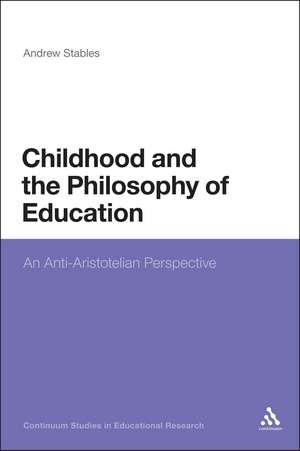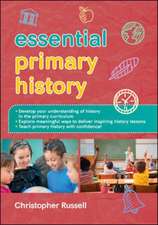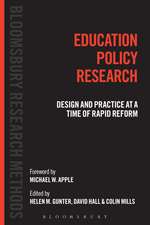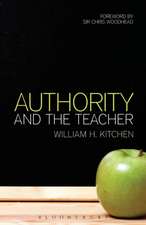Childhood and the Philosophy of Education: An Anti-Aristotelian Perspective: Continuum Studies in Educational Research
Autor Professor Andrew Stables Anthony Haynesen Limba Engleză Paperback – 4 mai 2011
This fascinating monograph seeks to overturn this philosophical tradition. It develops instead a "fully semiotic" perspective, arguing that in so far as children are no more or less interpreters of the world than adults, they are no more or less reasoning agents. This, the book shows, has radical implications, particularly for the question of how we seek to educate children. One Aristotelian legacy is the unquestioned belief that societies must educate the young irrespective of the latter's wishes. Another is that childhood must be grown out of and left behind.
| Toate formatele și edițiile | Preț | Express |
|---|---|---|
| Paperback (1) | 373.22 lei 6-8 săpt. | |
| Bloomsbury Publishing – 4 mai 2011 | 373.22 lei 6-8 săpt. | |
| Hardback (1) | 1065.25 lei 6-8 săpt. | |
| Bloomsbury Publishing – 19 dec 2008 | 1065.25 lei 6-8 săpt. |
Preț: 373.22 lei
Preț vechi: 419.35 lei
-11% Nou
Puncte Express: 560
Preț estimativ în valută:
71.41€ • 74.77$ • 59.23£
71.41€ • 74.77$ • 59.23£
Carte tipărită la comandă
Livrare economică 09-23 aprilie
Preluare comenzi: 021 569.72.76
Specificații
ISBN-13: 9781441198334
ISBN-10: 1441198334
Pagini: 210
Dimensiuni: 156 x 234 x 11 mm
Greutate: 0.3 kg
Editura: Bloomsbury Publishing
Colecția Continuum
Seria Continuum Studies in Educational Research
Locul publicării:London, United Kingdom
ISBN-10: 1441198334
Pagini: 210
Dimensiuni: 156 x 234 x 11 mm
Greutate: 0.3 kg
Editura: Bloomsbury Publishing
Colecția Continuum
Seria Continuum Studies in Educational Research
Locul publicării:London, United Kingdom
Caracteristici
Challenges many of the dominant assumptions about childhood, such as the desirability increasing compulsory schooling.
Notă biografică
Andrew Stables in Professor of Education and Philosophy in the Department of Education at the University of Bath, UK.
Cuprins
Introduction: The conception of childhood \ Part I: The Aristotelian Heritage \ 1.1. How Anti-Aristotelian can one be? \ 1.2. Aristotle's debt to Plato \ 1.3. Aristotle: children as people in formation \ 1.4. Histories of childhood: footnotes to Aristotle? \ 1.5. Pessimism and sin: the Puritan child \ 1.6. Optimism and enlightenment: the liberal child \ 1.7. Trailing clouds of glory: the romantic child \ 1.8. The postmodern child: less than not much? \ Part II: A Fully Semiotic View of Childhood \ 2.1. Living as semiotic engagement \ 2.2. The meaning-making semiotic child \ 2.3 Learning and schooling: Dewey and beyond \ Part III: Education Reconsidered \ 3.1. The roots of compulsory schooling \ 3.2 The extension of the in-between years \ 3.3 Teaching for significant events: identity and non-identity \ Part IV: The Child in Society \ 4.1 The child and the law \ 4.2 Semiosis and social policy \
4.3 Doing children justice \ References \ Index
4.3 Doing children justice \ References \ Index
Recenzii
'Too often, in recent years, there has been a propensity for academics writing about childhood, children's voice and growing up to offer a totalising constructionist account on the basis of too little evidence and a too unsubtle analysis. Here, Andrew Stables offers an antidote to the easy bon mot. His account of childhood relies on a careful reading of a range of historical and philosophical sources. Moreover he carefully explores the educational implications of his analysis of childhood; an analysis that avoids the twin perils of a crass essentialism on the one hand and a rootless deconstructed account on the other. To do so he draws on semiotic work to look at children as sign makers in their own right. Not everyone will agree with everything in Stables' book, but for those interested in thinking about childhood and education, it is a must read.' Professor James C Conroy, Dean of the Faculty of Education, University of Glasgow, UK
'Overall, the book provides a very interesting contribution to literature in child studies and education. Despite Stables' strong analytical-philosophical approach, the book covers a wide range of disciplines including history, ethics, environmental studies, pedagogy and political science...Stables' theory of living as semiotic engagement provides a unique and promising conceptual framework for the study of childhood and educational experience.' Environmental Education Research
Andrew Stables has written an impressive and exciting book. Childhood and the Philosophy of Education is an ambitious project that opens up new ways of thinking about childhood, learning and education
Andrew Stables has written an impressive and exciting book... the way in which Stables brings a wide range of ideas to bear on his exploration of complex themes and issues is a worthwhile and at times really innovative contribution to the field.
'What would it mean for our thinking about education, and in particular, our institutional arrangements for children's education, were we to think of children not as incomplete, or unprepared for the separate world of adults, but as semiotic engagers in life alongside adults? Andrew Stables explores the radical implications of this question in a lively and accessible manner, offering, along the way, a fascinating account of some central themes in the history and philosophy of childhood, and addressing the implications for our conceptualization of childhood and adulthood of some important strands in contemporary social and political theory, including environmental ethics, post-humanism and post-modernism. Whether or not one is convinced by Stables' claim that a reconceptualization of childhood is due, his analysis certainly offers a stimulating challenge to some existing conceptualizations.' Judith Suissa, Senior Lecturer in Philosophy of Education, Institute of Education, University of London, UK
'Overall, the book provides a very interesting contribution to literature in child studies and education. Despite Stables' strong analytical-philosophical approach, the book covers a wide range of disciplines including history, ethics, environmental studies, pedagogy and political science...Stables' theory of living as semiotic engagement provides a unique and promising conceptual framework for the study of childhood and educational experience.' Environmental Education Research
Andrew Stables has written an impressive and exciting book. Childhood and the Philosophy of Education is an ambitious project that opens up new ways of thinking about childhood, learning and education
Andrew Stables has written an impressive and exciting book... the way in which Stables brings a wide range of ideas to bear on his exploration of complex themes and issues is a worthwhile and at times really innovative contribution to the field.
'What would it mean for our thinking about education, and in particular, our institutional arrangements for children's education, were we to think of children not as incomplete, or unprepared for the separate world of adults, but as semiotic engagers in life alongside adults? Andrew Stables explores the radical implications of this question in a lively and accessible manner, offering, along the way, a fascinating account of some central themes in the history and philosophy of childhood, and addressing the implications for our conceptualization of childhood and adulthood of some important strands in contemporary social and political theory, including environmental ethics, post-humanism and post-modernism. Whether or not one is convinced by Stables' claim that a reconceptualization of childhood is due, his analysis certainly offers a stimulating challenge to some existing conceptualizations.' Judith Suissa, Senior Lecturer in Philosophy of Education, Institute of Education, University of London, UK

























